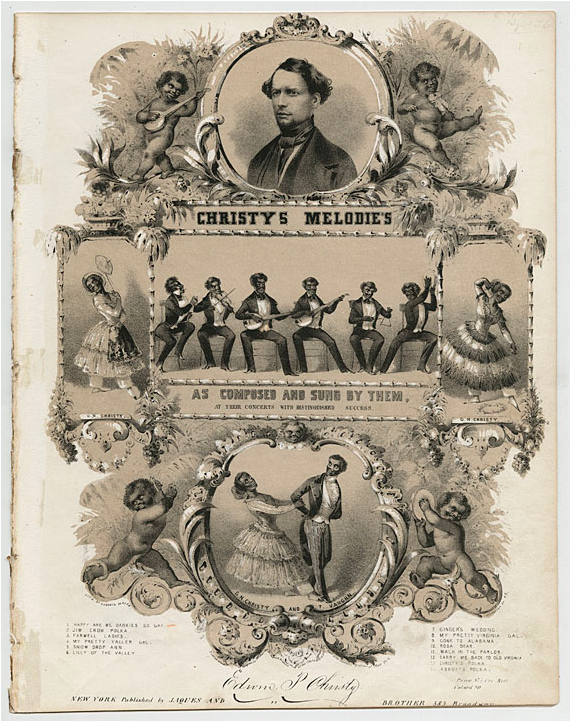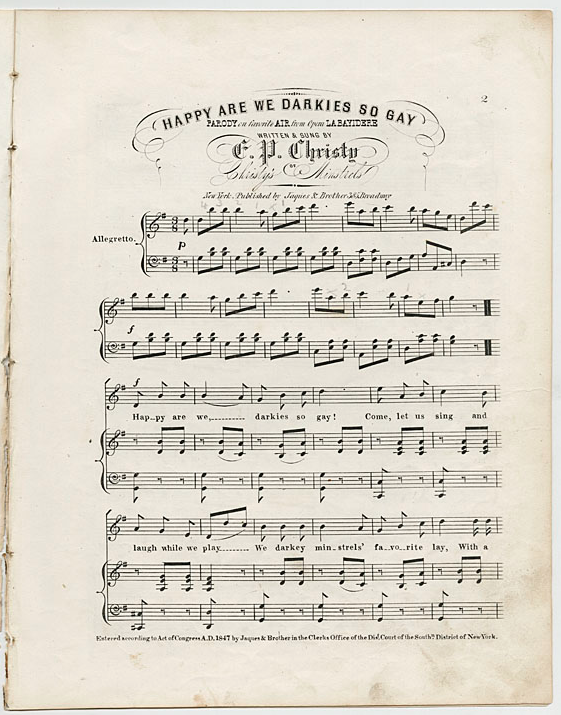American composer and performer, Edwin Pearce Christy, was an influential person in the history of Minstrelsy and theater in American history. His career in minstrelsy began in New York in the 1840s and from there he became a sensation. He and six other performers performed around the country in black-face and eventually he began composing his own minstrel songs and sketches. In 1855 he retired as a performer, but he continued to be involved in the theater as he managed his original group Christy’s Minstrels. This early form of minstrelsy was surely racist and prejudice, as slavery was still legal in the southern states. Here are a few examples of his work (note the cherubs are in black face surrounding Christy’s portrait… narcissistic racism at its’ finest.):
The tune in the image above, “Happy Are We Darkies So Gay” is yet another false portrayal of the African American sentiment. Slaves were not happy to be enslaved, and the minstrel shows went out of their way to satirically demonstrate a falsehood among white audiences that African American individuals liked doing menial work on plantations. Stephen Foster, a colleague of Christy but more well-known, created similar portrayals of plantation life through music and sketches. However, Foster was perhaps more admirable in that he sought to ‘eliminate objectionable lyrics’ that didn’t serve any purpose but to degrade that African American race. This was either a tactic to gain more supporters, thus a social and political move to further his career or maybe he truly had a kind(er) heart.
Fun fact: Christy committed suicide during the American Civil War for fear of money troubles…
Bibliography:
Saunders, Steven. “The Social Agenda of Stephen Foster’s Plantation Melodies.” American Music 30.3 (2012): 275-89. JSTOR. University of Illinois Press. Web. 13 Apr. 2015.
Christy, Edwin Pearce. “Happy Are We Darkies So Gay.” New York : Jaques and Brother: 1847. The Mills Music Library Digital Collection. http://digicoll.library.wisc.edu/WebZ/FETCH?sessionid=01-64337-741693744:recno=1:resultset=1:format=F:next=html/nffull.html:bad=error/badfetch.html&entityimageSize=x



Great post, Ellen! I appreciate the way you brought Foster into your story, and I’m especially glad you pointed out that not all songwriters wallowed in the depths of prejudice and discrimination (although there are certainly some Foster songs that do use dialect and offer up stereotypes, like “De Camptown Races”). One way to deepen this post is to engage with the music, not just with Christy’s biography. Did you notice the time signature of the piece? How would you characterize the melody? Does Christy ever dip into the repertory of minstrelsy tropes (pentatonic scales, syncopation, slapstick musical phrases)? It’s definitely not easy to connect lyrics or topic with music, but if you can, it’s particularly rewarding (and convincing for the reader!).